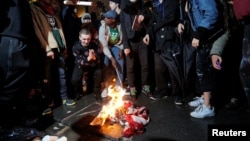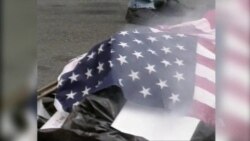U.S. President-elect Donald Trump called Tuesday for stiff penalties for protesters who burn American flags, even though the country's Supreme Court has ruled that it is a protected form of free speech.
"Nobody should be allowed to burn the American flag - if they do, there must be consequences - perhaps loss of citizenship or year in jail!" Trump said on his Twitter account.
It was not immediately clear what prompted the president-elect's tweet. But it came days after a college in the northeastern state of Massachusetts decided to stop flying U.S. flags after students allegedly burned a flag in protest of the Republican Trump's stunning upset win in the presidential election three weeks ago over Democrat Hillary Clinton.
On Sunday, veterans of the U.S. armed services and other demonstrators protested the no-flag decision by officials at Hampshire College. The school said it welcomes peaceful discussions about the flag, which is revered by millions of Americans.
Reaction
White House spokesman Josh Earnest said he, along with "the vast majority of Americans," find flag burning to be offensive.
But Earnest added, "We have a responsibility as a country to carefully protect the rights that are enshrined in the Constitution."
Kevin McCarthy, a Republican leader in the House of Representatives, said there are no plans to take legislative action against flag burning.
In recent decades, U.S. lawmakers have attempted several times to prohibit the burning or desecration of the red, white and blue U.S. flag with its 50 white stars symbolizing the country's 50 states.
But the Supreme Court ruled in 1989 that laws banning destruction of the flag as a form of protest were unconstitutional because they violated the First Amendment of the U.S. Constitution, which protects freedom of speech. A 1958 decision banned stripping one of U.S. citizenship as a form of criminal punishment.
Clinton, when she was a New York senator, joined efforts in 2005 to reinstitute a ban on flag burning, but the legislative attempt failed.













